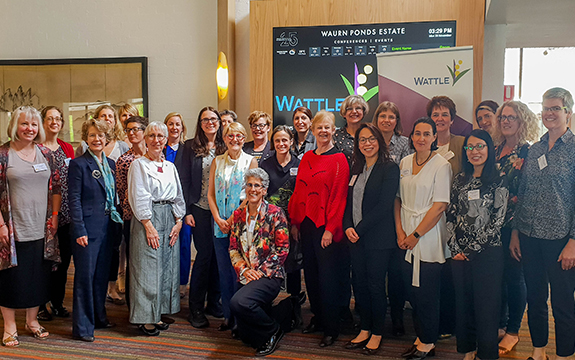Supporting aspiring leaders through the Women Attaining Leadership Program

In Summary
- Women Attaining Leadership Program launches across university sector in Australia
- The program provides women with the network and skills to move into leadership roles
- Women from the seven universities involved attended a retreat to launch the program
The Women Attaining Leadership Program (WATTLE), designed to provide women in the university sector with the network and skills to move into leadership roles, has been launched.
WATTLE is based on the New Zealand Women in Leadership Program (NZWiL) which has successfully helped women in universities aspiring to leadership roles.
The program’s four founders include Swinburne’s Professor Virginia Kilborn and Professor Helana Scheepers, as well as Griffith University’s Professor Rosemary Stockdale and La Trobe’s Professor Birgit Loch.
Professor Kilborn says the issue of low numbers of women in executive roles in the university sector needs to be addressed.
“Seeing as more than 50 per cent of undergraduates are women, we really do need to have that representation at all levels within the university system. WATTLE provides a framework for women who aspire to leadership roles, giving them pathways, support and the confidence to apply for those roles,” she says.
Connecting with women in leadership roles
As part of the program’s launch, representatives from the seven participating universities (Swinburne, La Trobe, RMIT, ANU, Deakin, Griffith and Curtin) attended a five day retreat at Deakin’s Geelong Waurn Ponds campus.
Professor Kilborn says the retreat was a highly valuable experience and a wonderful opportunity to hear from women in high-level leadership roles.
“Getting to know the women was incredible. They were from many different disciplines and people who I might not have met otherwise,” she says.
“The program began with a talk from Deakin’s Vice-Chancellor, Professor Jane den Hollander, and ended with us hearing from Federation University’s Vice-Chancellor, Professor Helen Bartlett. It was a fantastic way to bookend the program by hearing from such high-achieving and inspirational women.”
The group also heard from Lord Mayor Sally Capp, who provided practical advice on how she came to be in her position.
“She was very open with us about her path, her success and failures. She convinced us all to become what she calls ‘have-a-goers’ and said putting her hand up to have a go at as many things as possible has helped her to get where she is today. Hearing her story gave us the inspiration and confidence to do the same,” Professor Kilborn says.
Associate Professor Deborah Dempsey also attended the retreat and says it was a privilege to have access to a support network to draw on in future.
“The highlights of the program had to be the opportunity to hear so many senior women across the university sector present honestly about their varied career paths, and how they make things work and find support during challenging times,” Associate Professor Dempsey says.
Another Swinburne representative, Associate Professor Aimin Yu, says the program covered practical strategic leadership skills that she can use in future.
“RMIT’s Professor Lisa Farrell’s talk made me realise the importance of women being visible, and that we do not need to be in executive position to make change. Everyone’s little action could make substantial change to our working environment,” Associate Professor Yu says.
Swinburne and gender equity
Swinburne is part of the Science in Australia Gender Equity (SAGE) pilot program to improve the promotion and retention of women and gender minorities in STEMM and this year Swinburne's action plan towards gender equity was recognised with an inaugural SAGE Athena SWAN Bronze Award. For the past nine years Swinburne has also been recognised by the Workplace Gender Equality Agency (WGEA) as an Employer of Choice for Women.

